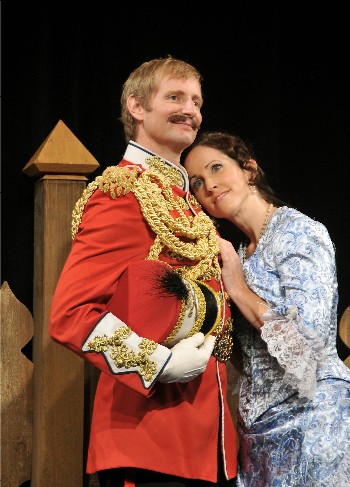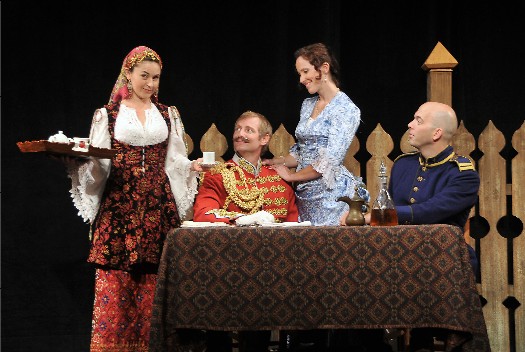Theater Review: “Arms and the Man” — A Workmanlike Serving of a Shavian Confection
There is nothing shocking, nothing sensational, nothing revelatory, in this workmanlike production of Arms and the Man. Nor should there be, as the play doesn’t give much room for innovation.
Arms and the Man by George Bernard Shaw. Directed by Warren Hammack. Staged by the Peterborough Players at the Peterborough Players Theatre, Peterborough, New Hampshire, through August 14.
By Jim Kates

Ryan Farley (Sergius) and Karen Peakes (Raina) find common ground in the Peterborough Players production of ARMS AND THE MAN. Photo: Deb Porter-Hayes
During its 76-year history, The Peterborough Players have produced plays by George Bernard Shaw 16 times, which amounts to more attention than they’ve paid to any other single playwright, including You-Know-Who. Some of their interpretations have been inspired. This is their third go-around with Arms and the Man. (The last production was in 1985.) It’s an early Shaw play (1898), pretty much of a chocolate-cream confection, with easy paradox and predictable romance, a whiff of eighteenth-century, class-conscious comedy, and enough mockery of heroic notions of military posturing to propel it into the twentieth century and the Great War to come.
The appeal is, of course, all in the Shavian dialogue, which can tyrannize a production by upstaging plot, stagecraft, and characterization. Warren Hammack’s direction does not get in the way of the words, and this production moves forward on the momentum of the script more than on the inventiveness of the presentation. Harry Feiner provides an aggressively ethnic set that places us in a cartoonish, Bulgarian household that has sent its men off to war against Serbia, leaving behind Madame Petkoff (Dale Hodges), her daughter Raina (Karen Peakes), and their two servants, Louka (Sevanne Martin) and Nicola (Kraig Swarz). An enemy Swiss mercenary, Captain Bluntschli (Tom Frey) scrambles through the window into Raina’s bedroom. Rescued and sent on his way, he later returns in peacetime as the unintended colleague of the householder Major Petkoff (Michael Dell’Orto) and Raina’s very much intended, Major Sergius Saranoff Ryan Farley).
Karen Peakes can scintillate, but here she only charms, except in her very last exchange with Frey, which crackles with surprising electricity and proves to be an affecting moment. Frey himself for the most part comes across far more a soldier in his bearing than his character calls for, although the words do allow for it—not enough of a bourgeois, hotel-keeping contrast with Farley’s self-conscious (both as an actor and as a character) Sergius. Frey, somewhat of an incongruous shock in the first act, comes into his own credibility in the third, although he can never quite pull off his repeatedly addressing Raina with the epithet “Dear Lady.” As for Farley, I don’t know whether it is he himself or the director who has him step on his own best line by whacking himself twice on his forehead. Too often in this production, he allows his performance to slip from comic opera into caricature.

Sevanne Martin (Louka), Ryan Farley (Sergius), Karen Peakes (Raina), and To Frey (Bluntschli) in the PP’s production of ARMS AND THE MAN. Photo: Deb Porter-Hayes
Sevanne Martin brings Louka across as the deepest and most consistent of characters, a servant who is not saucy, but misplaced in her social position and believably ready and able to move out of it. “How easy it is to talk,” she says, thereby summing up what is most dangerous in every sense in any Shaw play. Kraig Swartz keeps his potential comic ebullience in check, the role an oddly subdued one for him, but he lets his greater gifts show through in impeccable timing. Dale Hodges, a little shrilly maternal, and Michael Dell’Oro, appropriately petulantly genial, fill out their parental roles.
In short, there is nothing shocking, nothing sensational, nothing revelatory, in this workmanlike production. Nor should there be, as the play doesn’t give much room for innovation. It pleases on its own terms, and the Players turn it out appropriately.
Jim Kates is a poet, feature journalist and reviewer, literary translator and the president and co-director of Zephyr Press, a non-profit press that focuses on contemporary works in translation from Russia, Eastern Europe, and Asia. His latest book is Muddy River (Carcanet), a translation of verse by Russian existentialist Sergey Stratanovsky. His translation of Mikhail Yeryomin: Selected Poems 1957-2009 (White Pine Press) won the second Cliff Becker Prize in Translation.

The play was first produced in 1894, not 1898. However, it was first published in 1898.